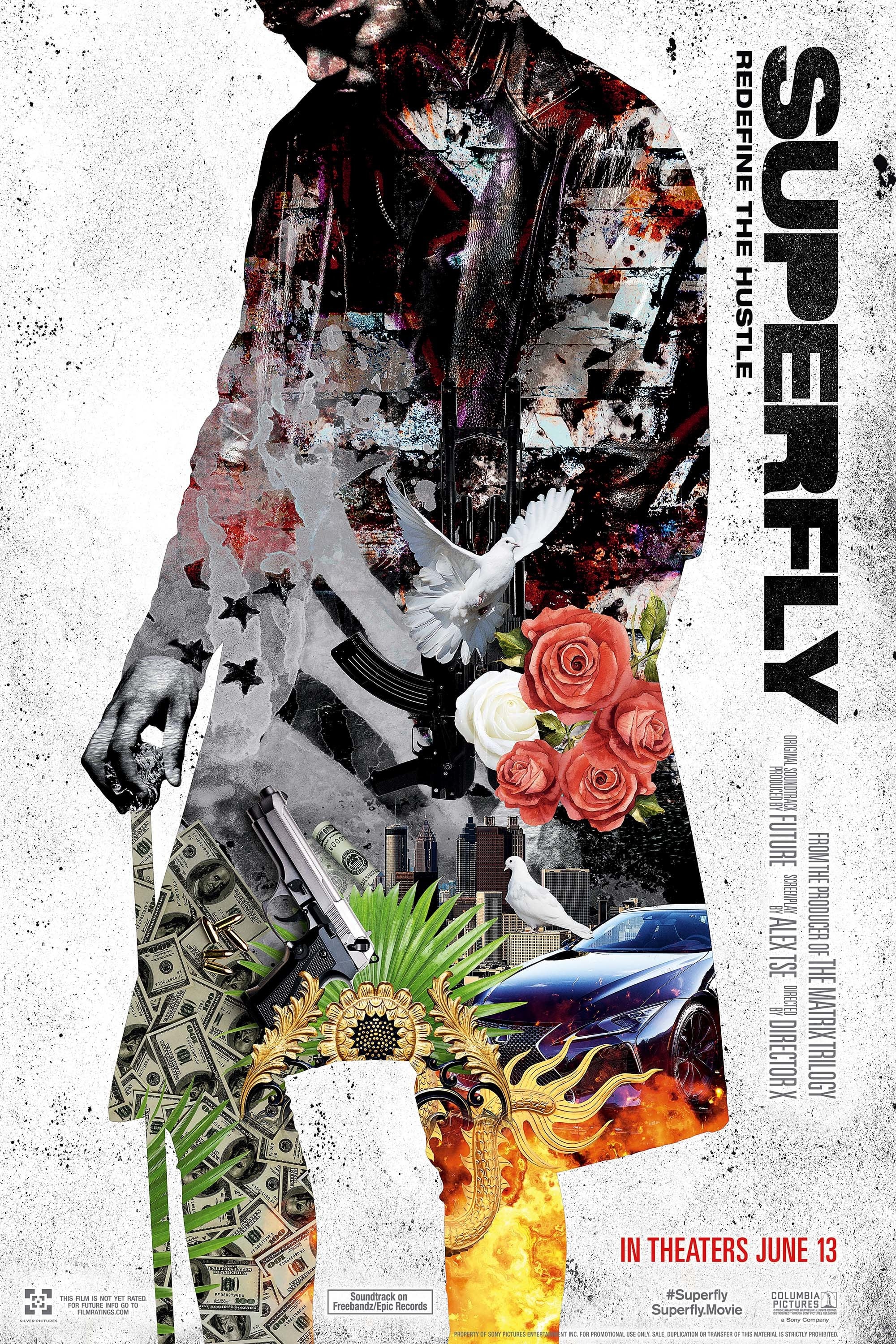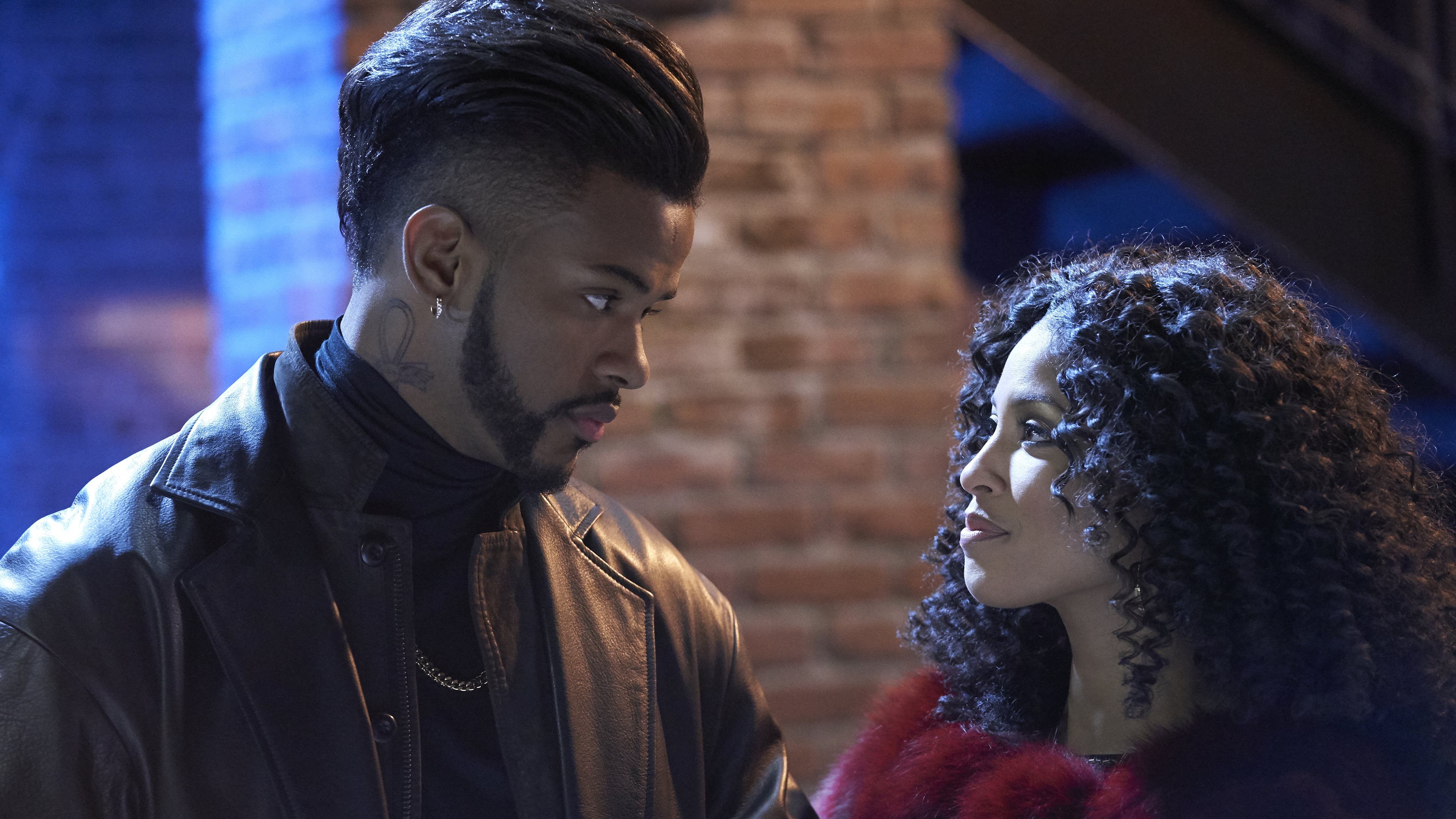
The only game you know is do or die
As dodgy, doomed to fail remakes go, Superfly actually does a pretty good job justifying its own existence. Obviously, the biggest and perhaps only way it ever had to justify its existence was by providing, after 46 years, a new chance to hear Curtis Mayfield's "Superfly" and "Pusherman" on the big screen. And in light of the original Super Fly's reputation as a world-beating soundtrack with a movie somewhat unnecessarily attached, the next thing would be for the new Superfly to have a pretty great soundtrack on its own. I lack the context to say whether this has happened or not, but it certainly is a very music-forward movie: the thirteen-song soundtrack was carefully curated by Future, who supplied some original tracks, and it is used by Director X (born Julian Christian Lutz, a hip-hop and rap music video director by trade, making his second feature film) with great purposefulness and a strong sense of how to adjust the pacing of the narrative musically.
The thing is, reputation or not, the 1972 Super Fly is rather a bit smarter than just some stuff that glues together outstanding Curtis Mayfield tracks. It's a rather stern and angry diagnosis of the post-Civil Rights era lot of African-Americans, as seen through the person of Youngblood Priest, a coke dealer living what anybody would consider to be an opulent, appealing life. That's still the basic driving force: Priest (Trevor Jackson) has it all, and he wants to get rid of it. The politics of the original film have been muted, as has the psychological acuity: where the first film presented Priest as suffering from some kind of spiritual malaise that he never put into words and which went unrecognised by the many people around him, the 2018 version of Priest is just scared for his life, following an altercation Juju (Kalaan Walker) with a hotheaded young member of Snow Patrol, one of the two big cocaine gangs in Atlanta. Priest decides that, for him and his partner Eddie (Jason Mitchell) to get out of the life, they need to make one huge deal, put away a whole lot of money very quickly, and then he can escape to the tropics with Georgia (Lex Scott Davis) and Cynthia (Andrea Londo), the two women who he lives with in polyamorous bliss. However, Priest's supplier, Scatter (Michael Kenneth Williams) is worried about destablising the market and bringing too much police attention to their operation, so Priest goes directly to the source: Adalberto Gonzalez (Esai Morales), youngest son of a Mexican cartel family, eager to prove his worth. Priest's recklessly ambitious plan appeals to him, and soon, Priest is flooding the entire southeastern U.S. with coke, severing his relationship with Scatter, pissing off Snow Patrol, getting himself in much too deep with Gonzalez, and coming to the unwanted attention of a corrupt "hero" cop, Turk Franklin (Brian Durkin) and his even more corrupt higher-up, Mason (Jennifer Morrison).
Through all of this, Superfly is a (surprisingly?) effective little crime thriller with just enough of a psychological bent to feel deeper than it is. Priest and Eddie make for a good pair of leads, particularly the latter: Eddie has been cast as both the comic relief and the voice of pragmatic, pessimistic wisdom, an unusual joining that Mitchell turns into a strong, interesting figure just slightly at odds to the rest of the film. For his part, Jackson reads as much younger than the role would seem to demand, but there's something about that which kind of works: Priest's increasing desperation and panic over the course of the film have a more youthful bent.
The big problem with the new Superfly as a story is that it forces itself to go too big: while the first film was really all about Priest and his own conscience, this one is a four-way struggle between Priest, the cartel, Snow Patrol, and the dirty cops, and this naturally enough means that it need to escalate as it goes along. The film is, at heart, an action movie, though it spends the first three-fifths of its 116-minute running time doing what it can to avoid this fact. And those three-fifth range are pretty good. Not perfect: the film's embrace of a digital aesthetic leaves it with a distinct glossy sheen, and this makes it hard to admire it as a tour of Atlanta the way the 1972 film was such an impressive document of New York (also, Atlanta's position in culture and the world in the 2010s is so extremely far from New York in the '70s or really any other decade in the last century and a half that an Atlanta-bound Superfly was never going to be such a great study of a particular place). Still, the strong colors and bright lighting in both the interiors and exteriors of Amir Mokri's cinematography are terrifically appealing, giving the film a certain vigor that works well with its more callow, youthful version of Priest.
Director X certainly has no qualms about making the world Priest inhabits look glamorous, but the film's commitment to location photography has the happy benefit of bringing in some weathered, aged, run-down places to contrast with the bold colors of the nightclubs and the luxurious house that are the outward face of the protagonist's life. I hesitate to say that the film looks "realistic", because that's very much wrong, but it does have a certain hands-off honesty in certain moments that give it more of a charge than I walked in expecting.
And then those last two-fifths just turn into an altogether different movie. We learn one thing early one: Director X has no facility for action scenes. This is disappointing enough, but even if the action was better, there'd be the lingering problem that action really needn't be here: the film is at its most interesting when it remains tied to Priest's mind and actions, and as the car chases and gun battles pile up, the protagonist loses all distinction to become just one more badass in a leather duster, as the camera whirls around and the editing jumps about, ruining any and all sense of spatial continuity. Basically, the last half-hour of Superfly becomes totally soulless, impersonal, poorly-shot, and worst of all boring, and it scuttles a movie that really was up to some interesting stuff, in its limited way.
The thing is, reputation or not, the 1972 Super Fly is rather a bit smarter than just some stuff that glues together outstanding Curtis Mayfield tracks. It's a rather stern and angry diagnosis of the post-Civil Rights era lot of African-Americans, as seen through the person of Youngblood Priest, a coke dealer living what anybody would consider to be an opulent, appealing life. That's still the basic driving force: Priest (Trevor Jackson) has it all, and he wants to get rid of it. The politics of the original film have been muted, as has the psychological acuity: where the first film presented Priest as suffering from some kind of spiritual malaise that he never put into words and which went unrecognised by the many people around him, the 2018 version of Priest is just scared for his life, following an altercation Juju (Kalaan Walker) with a hotheaded young member of Snow Patrol, one of the two big cocaine gangs in Atlanta. Priest decides that, for him and his partner Eddie (Jason Mitchell) to get out of the life, they need to make one huge deal, put away a whole lot of money very quickly, and then he can escape to the tropics with Georgia (Lex Scott Davis) and Cynthia (Andrea Londo), the two women who he lives with in polyamorous bliss. However, Priest's supplier, Scatter (Michael Kenneth Williams) is worried about destablising the market and bringing too much police attention to their operation, so Priest goes directly to the source: Adalberto Gonzalez (Esai Morales), youngest son of a Mexican cartel family, eager to prove his worth. Priest's recklessly ambitious plan appeals to him, and soon, Priest is flooding the entire southeastern U.S. with coke, severing his relationship with Scatter, pissing off Snow Patrol, getting himself in much too deep with Gonzalez, and coming to the unwanted attention of a corrupt "hero" cop, Turk Franklin (Brian Durkin) and his even more corrupt higher-up, Mason (Jennifer Morrison).
Through all of this, Superfly is a (surprisingly?) effective little crime thriller with just enough of a psychological bent to feel deeper than it is. Priest and Eddie make for a good pair of leads, particularly the latter: Eddie has been cast as both the comic relief and the voice of pragmatic, pessimistic wisdom, an unusual joining that Mitchell turns into a strong, interesting figure just slightly at odds to the rest of the film. For his part, Jackson reads as much younger than the role would seem to demand, but there's something about that which kind of works: Priest's increasing desperation and panic over the course of the film have a more youthful bent.
The big problem with the new Superfly as a story is that it forces itself to go too big: while the first film was really all about Priest and his own conscience, this one is a four-way struggle between Priest, the cartel, Snow Patrol, and the dirty cops, and this naturally enough means that it need to escalate as it goes along. The film is, at heart, an action movie, though it spends the first three-fifths of its 116-minute running time doing what it can to avoid this fact. And those three-fifth range are pretty good. Not perfect: the film's embrace of a digital aesthetic leaves it with a distinct glossy sheen, and this makes it hard to admire it as a tour of Atlanta the way the 1972 film was such an impressive document of New York (also, Atlanta's position in culture and the world in the 2010s is so extremely far from New York in the '70s or really any other decade in the last century and a half that an Atlanta-bound Superfly was never going to be such a great study of a particular place). Still, the strong colors and bright lighting in both the interiors and exteriors of Amir Mokri's cinematography are terrifically appealing, giving the film a certain vigor that works well with its more callow, youthful version of Priest.
Director X certainly has no qualms about making the world Priest inhabits look glamorous, but the film's commitment to location photography has the happy benefit of bringing in some weathered, aged, run-down places to contrast with the bold colors of the nightclubs and the luxurious house that are the outward face of the protagonist's life. I hesitate to say that the film looks "realistic", because that's very much wrong, but it does have a certain hands-off honesty in certain moments that give it more of a charge than I walked in expecting.
And then those last two-fifths just turn into an altogether different movie. We learn one thing early one: Director X has no facility for action scenes. This is disappointing enough, but even if the action was better, there'd be the lingering problem that action really needn't be here: the film is at its most interesting when it remains tied to Priest's mind and actions, and as the car chases and gun battles pile up, the protagonist loses all distinction to become just one more badass in a leather duster, as the camera whirls around and the editing jumps about, ruining any and all sense of spatial continuity. Basically, the last half-hour of Superfly becomes totally soulless, impersonal, poorly-shot, and worst of all boring, and it scuttles a movie that really was up to some interesting stuff, in its limited way.
Categories: action, crime pictures, needless remakes, summer movies, thrillers






